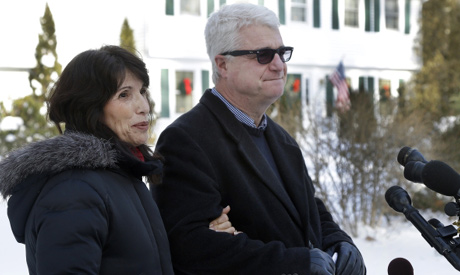
Diane and John Foley speak about their son, James Foley, 39, a journalist who was kidnapped in Syria by unknown gunmen, 3 January, 2013 (Photo: AP)
The parents of an American journalist kidnapped in Syria more than four months ago said Thursday that his latest disappearance is more upsetting than an earlier one in Libya because they don't know who is holding him.
James Foley, 39, was working in northwest Syria with another journalist when they were kidnapped by unknown gunmen on Nov. 22, his parents said. Foley had been working in Syria for about a year and was contributing videos to Agence France-Press, which has vowed to help secure his release.
It's unclear whether he's being held by the government, a rebel group or a criminal gang, said his mother, Diane Foley.
"We don't know who to direct our plea to," she said. "We don't know who is holding him or why."
Foley was held for six weeks by the Libyan government in 2011, but his parents said that situation was very different because the U.S. government worked with the Libyan government to secure his release and provided them with regular updates.
The U.S. does not currently have a formal relationship with Syria and there has been no regular or reliable information about Foley, his parents said. Though they have been in touch with federal officials, they said the most they've received are rumors of their son's whereabouts.
"I joked a while ago that it would be nice to hear from a terrorist asking for $10 million just so we know he's alive," said his father, John Foley.
The Foleys traveled to Milwaukee from their home in Rochester, New Hampshire, for a Friday night vigil for their son at Marquette University, where he studied history. He taught in Arizona, Massachusetts and Chicago before switching careers to become a journalist.
He had been working in war zones for about five years when he was taken captive in Libya while covering that country's civil war. Another journalist — South African photographer Anton Hammerl — was shot during their capture and left to die in the desert. Foley and another journalist were released.
"I'll regret that day for the rest of my life," Foley told The Associated Press in 2011. "I'll regret what happened to Anton."
Friday is the two-year anniversary of his capture in Libya. If he had doubt about going back to a war zone, his parents said he didn't share it with them.
His father said he doesn't feel his son was reckless. Any journalist committed to covering conflict and war takes some risk, he said.
"It's just the nature of the occupation and the environment," John Foley said. He added, "He wanted to tell stories about people that were truthful and that would help them."
Twenty-eight journalists were killed in Syria in 2012, prompting the Committee to Protect Journalists to name it the most dangerous country in the world to work in last year.
Those who lost their lives include award-winning French TV reporter Gilles Jacquier, photographer Remi Ochlik and Britain's Sunday Times correspondent Marie Colvin. Also, Anthony Shadid, a correspondent for The New York Times, died after an apparent asthma attack while on assignment in Syria.
Foley had agreed to text his mother about every 48 hours so that she wouldn't worry, and he had a video conference with his parents once a week. They learned about his disappearance in a phone call from Clare Morgana Gillis, the journalist held captive with him in Libya.
His parents said federal officials have advised them to keep quiet, and they did for more than a month. Diane Foley said they decided to speak out because publicity seemed to help secure their son's release in 2011. Still, they second-guess themselves.
"Are we going to make him too valuable?" John Foley asked. "If we don't say anything, is he not valuable enough?"
Short link: